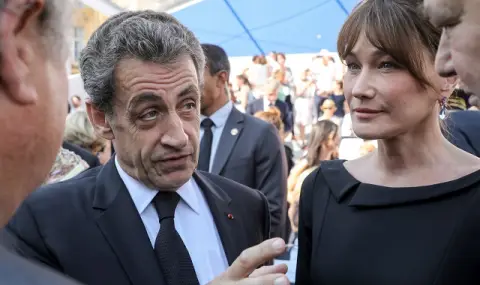Did Nicolas Sarkozy receive illegal funds from Muammar Gaddafi? The trial against the former French president began a few days ago. The indictment resembles a spy movie script.
In early January 2025, the trial of the so-called Libyan affair began in Paris. The key defendants are former French President Nicolas Sarkozy, his former chief of staff Claude Gueant and former Interior Minister Brice Ortefeuille. Jean-Luc Sibiud, who was France's ambassador to Libya from 2004 to 2007, is a witness in the case. "Sarkozy and Muammar Gaddafi met in a large tent, along with other people", explains Sibiud. "Then I saw them leave, just the two of them with their translators."
The former ambassador cannot say what the leaders talked about, although the prosecution has repeatedly asked him this question. However, it is this meeting between Sarkozy and Gaddafi that may prove to be of key importance in this trial. The prosecution believes that Sarkozy made a "corruption deal" with the Libyan dictator. It is alleged that Gaddafi offered him funding for the 2007 election campaign, when Sarkozy won the election. In return, the former French president promised to help the dictator polish his image, the prosecution claims. Gaddafi, who ruled Libya from 1969 to 2011, was accused of multiple human rights violations and sponsoring international terrorism.
Like a spy movie script
For over ten years, judges have been investigating the case. The indictment is 557 pages long, telling of trips by Sarkozy's trusted people to Libya, meetings with intermediaries, suspicious transfers and alleged suitcases of money. This story resembles a spy movie script.
Christophe Ingren, one of Sarkozy's lawyers, categorically denies everything and says that there is simply no evidence. "There are no clear traces such as money transfers or direct payments, nor do we know what the alleged amount was," he commented to DW.
In the early days of the case, Sarkozy even spoke of a conspiracy against him. He claims that Gaddafi once wanted to take revenge on him because the former French president led the international coalition that overthrew the dictator in 2011. In 2012, the investigative platform "Mediapart" published a document from the Libyan secret services, according to which Gaddafi agreed to give Sarkozy 50 million euros for his campaign. However, Sarkozy also calls this document "a brutal forgery".
The biggest state affair in the history of France?
Journalist from "Mediapart" Fabrice Arfi disagrees with Sarkozy's assessment. Arfi often attends the hearings in the case. His documentary about the alleged Libyan affair was recently released. "The French courts confirmed that the document was not a forgery," he says, describing how he and his colleagues uncovered information about the case. In 2011, Arfi and a colleague from "Mediapart" received an email that launched the investigation into the so-called Libyan affair. The sender of the email gave them access to the archive of Ziad Takkidin, one of the alleged intermediaries in the affair.
"In this archive there were tens of thousands of documents, bank statements, handwritten notes and more. It became clear to us that this could be the biggest state affair in the history of France," says Arfi.
Since then, "Mediapart" has published about 160 articles on the subject. For the journalist, this case and other previous ones demonstrate France's hypocrisy. "We always claim to be a country that protects human rights. But two of our former prime ministers - Alain Juppe and François Fillon - have already been convicted of corruption. The same goes for Jacques Chirac and even Sarkozy, who was found guilty in another case," Arfi told DW. Sarkozy will soon have to start wearing a police bracelet on his leg because he was convicted on charges of bribing a judge to obtain information about another case against him.
French politicians often accuse the judiciary of a "conspiracy". Sociologist and political scientist Cecile Vigor does not understand this trend. "They act as if justice does not apply to them. But it is the same for everyone." The expert explains that French society has high trust in its judicial system. If politicians are not convicted, however, the authority of the court can be undermined. "If trust in the judicial system declines, trust in other institutions and in democracy will also decline, making them vulnerable - including to attempts at external interference," Vigor believes.
Can this case serve as an example?
France has been working hard to boost trust in its institutions in recent years, says Alina Mungiu-Pippidi, a professor at the "Luis Guido Carli" University in Rome. In her research, she compares the level of corruption in 146 countries. "It used to be a tradition for ruling parties in France to receive illegal donations from African dictators", she explains. "But now the rules for prosecuting corruption in France are stricter than those in the entire EU."
In addition, independent media outlets are also uncovering corruption scandals in the country. "Thirty years ago, there was no investigative journalism about corruption in France. You couldn't talk about the private lives or incomes of politicians - they were untouchable. Today it's different," emphasizes Mungiu-Pippidi.
Vincent Brengart of the anti-corruption organization "Sherpa" is one of the plaintiffs in the case against Sarkozy. He believes it could strengthen trust in the institutions. "The best response to the fact that some people doubt the objectivity of our judicial system is to carefully examine each element. The court is doing exactly that. This case will take four months, which is unusually long for such a case," he says. A verdict is expected on April 10.
If Nicolas Sarkozy and the other 12 defendants in the case are found guilty, they could face up to 10 years in prison and fines of 750,000 euros.
